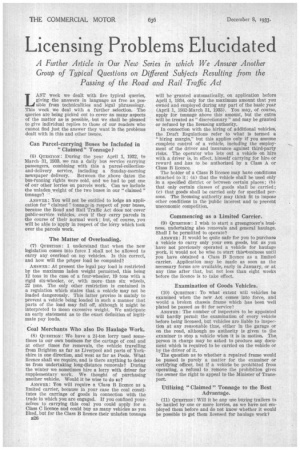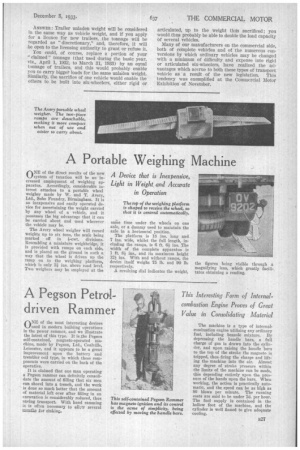Licensing Problems Elucidated
Page 40

Page 41

If you've noticed an error in this article please click here to report it so we can fix it.
A Further Article in Our New Series in which We Answer Another Group of Typical Questions on Different Subjects Resulting from the Passing of the Road and Rail Traffic Act
LAST week we dealt with five typical queries, giving the answers in language as free as possible from technicalities and legal phraseology. This week we deal with a further selection. The queries are being picked out to cover as many aspects of the matter as is possible, but we shall be pleased to give individual replies to those of our readers who cannot find just the answer they want in the problems dealt with in this and other issues.
Can Parcel-carrying Buses be Included in "Claimed" Tonnage?
()QUESTION : During the year April 1, 1932, to March 31, 1933, we ran a daily bus service carrying passengers, combining with this a parcel-collectionand-delivery service, including a Sunday-morning newspaper delivery. Between the above dates the bus-running rights were sold, and we had to put one of our other lorries on parcels work. Can we include the unladen weight of the two buses in our " claimed " tonnage? '
ANSWER : You will not be entitled to lodge an application for " claimed " tonnage in respect of your buses, because the Road and Rail Traffic Act does not cover public-service vehicles, even if they carry parcels in the course of their normal work ; but, of course, you will be able to apply in respect of the lorry which took over the parcels work.
The Matter of Overloading.
(7) QUESTION: I understand that when the new legislation comes into force I shall not be allowed to carry any overload on my vehicles. Is this correct, and how will the pilver load be computed?
ANSWER: At present the legal pay load is restricted by the maximum laden weight permitted, this being 12 tons in the case of a four-wheeler, 19 tons with a rigid six-wheeler, or, with more than six wheels, 22 tons. The only other restriction is contained in a regulation which states that a vehicle may not be loaded dangerously. This latter proviso is mainly to prevent a vehicle being loaded in such a manner that parts of the load may fall off, although it might be interpreted to mean excessive weight. We anticipate an early statement as to the exact definition of legitimate pay loads.
Coal Merchants Who also Do Haulage Work.
(8) QUESTION: We have a 2i-ton lorry used sometimes in our own business for the cartage of coal and at other times for removals, the vehicle travelling from Brighton as far as Liverpool and parts of Yorkshire in one direction, and west as far as Poole. What licence shall we require, and is there anything to debar us from undertaking long-distance removals? During the winter we sometimes hire a lorry with driver for supplementary work. We thought of purchasing another vehicle. Would it be wise to do so?
ANSWER: You will require a Class B licence as a limited carrier, because in your case the coal constitutes the carriage of goods in connection with the trade in which you are engaged. If you confined yourselves to carrying this coal you could apply for a Class C licence and could buy as many vehicles as you liked, but for the Class B licence their unladen tonnage B26 will be grantedautomatically, on application before April 1, 1934, only for the maximum amount that you owned and employed during any part of the basic year (April 1, 1932-Mareh 31, 1933). You may, of course, apply for tonnage above this amount, but the extra will be treated as " discretionary " and may be granted or refused by the licensing authority.
In connection with the hiring of additional vehicles, the Draft Regulations refer to what is termed a "hiring margin," but this applies only if you assume complete control of a vehicle, including the employment of the driver and insurance against third-party risks. The operator who lets out a vehicle on hire with a driver is, In effect, himself carrying for hire or reward and has to be authorized by a Class A or Class B licence.
The holder of a Class B licence may have conditions attached to it: (a) that the vehicle shall be used only in a specified district or between certain places; (b) that only certain classes of goods shall be carried; (c) that goods shall be carried only for specified persons. The licensing authority may think fit to impose other conditions in the public interest and to prevent uneconomic competition.
Commencing as a Limited Carrier.
(9) QUESTION: I wish to start a greengrocer's business, undertaking also removals and general haulage. Shall I be permitted to operate?
ANswan: It would be quite safe for you to purchase a vehicle to carry only your own goods, but as you have not previously operated a vehicle for haulage work, it would not be wise to start thisebusiness until you have obtained a Class B licence as a limited carrier. Application may be made as soon as the necessary forms are available, early in January, or at any time after that, but not less than eight weeka before the licence is to take effect.
Examination of Goods Vehicles.
(10) QUESTION: To what extent will vehicles be examined when the new Act comes into force, and would a broken chassis frame which has been well plated be passed as fit for service?
ANSWER: The number of inspectors to be appointed will hardly permit the examination of every vehicle before being licensed, but vehicles are liable to inspection at any reasonable time, either in the garage or on the road, although no authority is given to the examiner to stop a vehicle when it is in motion. The person in charge may be asked to produce any document which is required to be carried on the vehicle or by the driver of it. .
The question as to whether a repaired frame would be passed is purely a matter for the examiner or certifying officer, but if a vehicle be prohibited from operating, a refusal to remove the prohibition gives the owner the right to appeal to the Minister of Transport.
Utilizing " Claimed " Tonnage to the Best Advantage.
(11) QUESTION: Will it be any use buying trailers to he hauled by one or more lorries, as we have not employed them before and do not know whether it would be possible to get them licensed for haulage work? ANSWER: Trailer unladen weight will be considered in the same way as vehicle weight, and if you apply for a licence for new trailers, the tonnage will be regarded as "discretionary," and, therefore, it will be open to the licensing authority to grant or refuse it.
You could, of course, replace a portion of your "claimed" tonnage (that used during the basic year, viz., April 1, 1932, to March 31, 1933) by an equal tonnage of trailers, and this would probably enable you to carry bigger loads for the same unladen weight. Similarly, the sacrifice of one vehicle would enable the others to be built into six-wheelers, either rigid or articulated, up to the weight thus sacrificed; you would thus probably be able to double the load capacity of several vehicles.
Many of our manufacturers on the commercial side, both of complete vehicles and of the numerous conversions by which ordinary vehicles may be changed with a minimum of difficulty and expense into rigid or articulated six-wheelers, have realized the advantages which accrue to both these types of transport vehicle as a result of the new legislation. This tendency was exemplified at the Commercial Motor Exhibition of November.




























































































